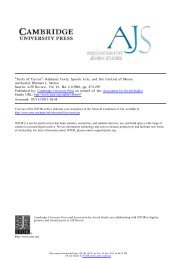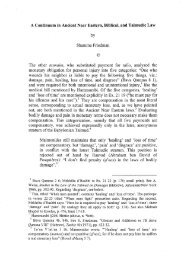Wimpfheimer_ Is it not so.pdf
Wimpfheimer_ Is it not so.pdf
Wimpfheimer_ Is it not so.pdf
You also want an ePaper? Increase the reach of your titles
YUMPU automatically turns print PDFs into web optimized ePapers that Google loves.
Table 1. Mishnah<br />
Toward a Poetics of Legal Narrative in the Talmud ❙ 63<br />
Decisive Factor 1 Mishnah Decisive Factor 2<br />
Owner<br />
presence<br />
Force majeure<br />
Ordinary<br />
loss/theft<br />
Negligence<br />
Borrower Not liable Liable Liable Liable<br />
Renter Not liable Not liable Liable Liable<br />
Free Watchman Not liable Not liable Not liable Liable<br />
cases of renter negligence, but nowhere directly addresses the question of owner<br />
presence. Talmud Yerushalmi records an amoraic discussion that hinges on this<br />
issue.⁵⁶ Talmud Bavli c<strong>it</strong>es an amoraic debate about this explic<strong>it</strong> case. Moreover, the<br />
Bavli's debate is attributed to scholars who lived two generations after the events<br />
narrated by this story. The stam, the ®rst in a long line of trad<strong>it</strong>ional readers, is<br />
ultimately forced by the existence of this explic<strong>it</strong> sixth-generation debate to reject<br />
the received narrative trad<strong>it</strong>ion of our story and rewr<strong>it</strong>e the whole narrative.⁵⁷ It is<br />
di³cult to accept the existence of undeniable binding precedent for Rava when the<br />
<strong>so</strong>urces record <strong>not</strong>hing but debate, even after his lifetime!<br />
A formal legal cr<strong>it</strong>ique can al<strong>so</strong> be leveled against the trad<strong>it</strong>ional interpretation.<br />
A reading that pos<strong>it</strong>s the obvious predominance of owner presence assumes that the<br />
threshold of owner presence is met in this case. Our earlier narrative's opening<br />
section underlined very clearly the formal requirement of prior contracting for the<br />
exoneration exception of owner presence. In this narrative, by contrast, Mar's<br />
services, though pro²ered, are never explic<strong>it</strong>ly contracted, e<strong>it</strong>her before or after the<br />
renting of the animal.⁵⁸ If no clear precedent exists and the formal requirements for<br />
owner presence are <strong>not</strong> met, how can the legal outcome in the courtroom be a selfevident<br />
propos<strong>it</strong>ion? A new reading grounded in the hermeneutics of suspicion<br />
utilizes a trend w<strong>it</strong>hin Rava's jurisprudence to create a new context for understanding<br />
his shame.<br />
Mishnah Bava Metsi¦a 7:9 o²ers a sliding scale as the paradigm for liabil<strong>it</strong>y<br />
when one is in legal control of a<strong>not</strong>her's goods (see Table 1). One who borrows an<br />
animal is liable for that animal regardless of how the animal is lost. By contrast, a<br />
renter is <strong>not</strong> liable for force majeureÐdisasters that lie beyond the renter's protective

















